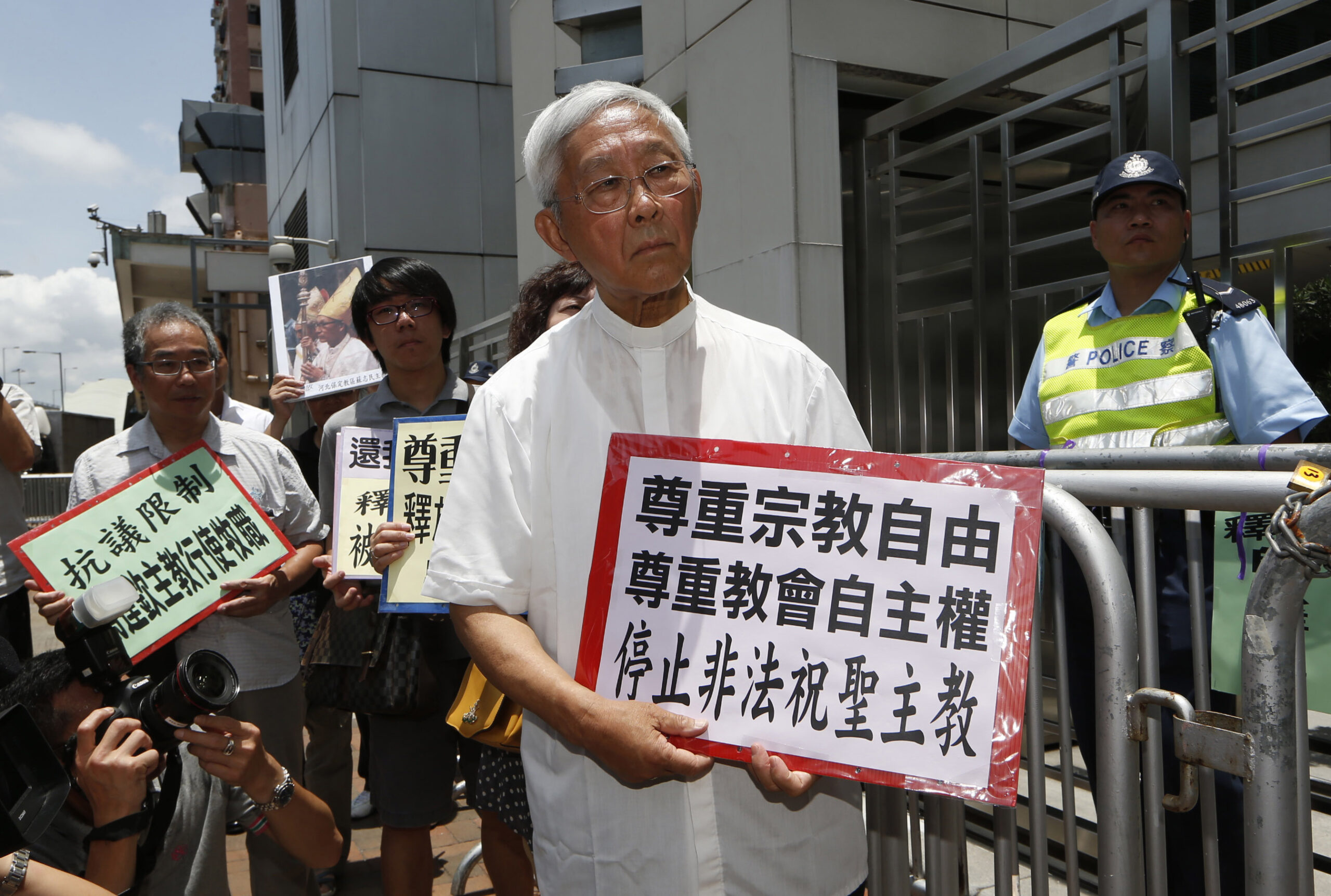VATICAN CITY (RNS) — While the Vatican hopes to renew a secretive and controversial deal with China regarding bishops’ appointments, the European Parliament urged the Catholic institution to stand in defense of religious freedom in Hong Kong.
The European Parliament called on the Holy See to “strengthen its diplomatic efforts and its leverage on the Chinese authorities” in a resolution on Thursday (July 7), as some Catholics and other religious minorities face growing persecution in the country.
On May 11, the former bishop of Hong Kong, Cardinal Joseph Zen, was arrested by Chinese authorities along with four other pro-democracy activists. The cardinal was released a day later, and his trial is expected to take place Sept. 19, with Zen pleading not guilty on all charges.
The EU resolution encouraged the Vatican “to give full support to Cardinal Zen and other religious leaders who face persecution or the risk of detention under the national security regime in Hong Kong.” The parliament also called on the Vatican “to demand that all charges against Cardinal Zen be dropped and (for) an end to persecution and human rights violations.”
Hong Kong, which had enjoyed a special status within China, has been facing a crackdown as the Chinese government introduced national security laws that have led to mass pro-democracy protests and thousands of arrests. The Vatican envoy in Hong Kong warned Catholic missionaries in the city on July 5 that “change is coming, and you’d better be prepared” and that the city is no longer “the great Catholic beachhead it was.”
The EU resolution described Zen as “one of the strongest advocates of the city’s pro-democracy movement.”
While the resolution is nonbinding, it specified that the president of the European Parliament, Roberta Metsola, must communicate its content to the Holy See.
The European Parliament isn’t alone in calling for a stronger condemnation of China on the part of the Vatican, which has been embroiled in a lengthy and complicated diplomatic dialogue with the rising economic power. Many Catholics have criticized a provisional agreement between China and the Vatican signed in 2018 and renewed every two years.
The Sino-Vatican agreement has already been renewed once in 2020 and is expected to be up for negotiations soon. While the text of the document has been kept secret, Vatican officials have confirmed that it builds a compromise between the pope and the Chinese Communist Party for the appointment of bishops.
While the Catholic Church in China defies easy categorization, it operates in an uneasy space between official recognition as a church by the Chinese government and a so-called underground church that only swears fealty to Rome.

FILE – Hong Kong’s outspoken cardinal Joseph Zen, center, and other religious protesters hold placards with “Respects religious freedom” written on them during a demonstration outside the China Liaison Office in Hong Kong, Wednesday, July 11, 2012. Reports say a Roman Catholic cardinal and three others have been arrested in Hong Kong on suspicion of colluding with foreign forces to endanger Chinese national security. U.K.-based human rights group Hong Kong Watch said Cardinal Joseph Zen, lawyer Margaret Ng, singer Denise Ho and scholar Hui Po-keung were detained Wednesday, May 11, 2022, by Hong Kong’s National Security Police. (AP Photo/Kin Cheung, File)
Zen has been an outspoken critic of the deal and has publicly condemned the Chinese government for its violations of religious freedom. After his arrest, the No. 2 official at the Vatican, Cardinal Pietro Parolin, expressed his relief the cardinal “was freed and treated well.”
Parolin, who was among the main architects of the Sino-Vatican deal, also voiced his “most concrete hope that initiatives like this cannot complicate the already complex path of dialogue between the Holy See and the Church in China.”
In a wide-ranging interview with Reuters published last week, Pope Francis said that while the agreement might be coming along slowly, it is “moving well,” and he hopes it will be renewed in October. The pope also acknowledged that “it is not the same situation in every region of the country,” adding that the treatment of Catholics “also depends on local leaders.”
RELATED: Pope Francis wants two women on the committee that proposes bishops
In May, the Vatican’s secretary for Relations with States, Archbishop Paul Gallagher, said the agreement was not moving as smoothly as hoped. In the four years since the deal was signed, only six bishops have been ordained in China, and almost a year has passed since a bishop was appointed. Only three of the underground bishops have been made official so far, and over a third of Chinese dioceses still don’t have a bishop, according to Asianews, the official press agency of the Pontifical Institute for Foreign Missions.
Some have criticized the deal for limiting the Vatican’s ability to call out China on human rights violations. In 2020, the U.S. Secretary of State at the time, Mike Pompeo, criticized the Vatican’s dovish approach on China while urging it to not compromise its “moral witness.” Since then, Pope Francis’ critics have lamented his failure to speak up for Hong Kong’s citizens and for the Uyghur Muslims, who have faced human rights violations in China’s Xinjiang region.
Pope Francis is aware of the criticism but said in the interview that he’s in it for the long haul. “Diplomacy is like that. When you face a blocked situation, you have to find the possible way, not the ideal way, out of it,” he said.
Comparing the situation in China to the backlash his papal predecessors faced for negotiations with countries in the Soviet bloc in the ’60s and ’70s, Francis stressed the incremental advantages of diplomacy as “the art of the possible.”
RELATED: How the Catholic Church transformed American Jewish life

